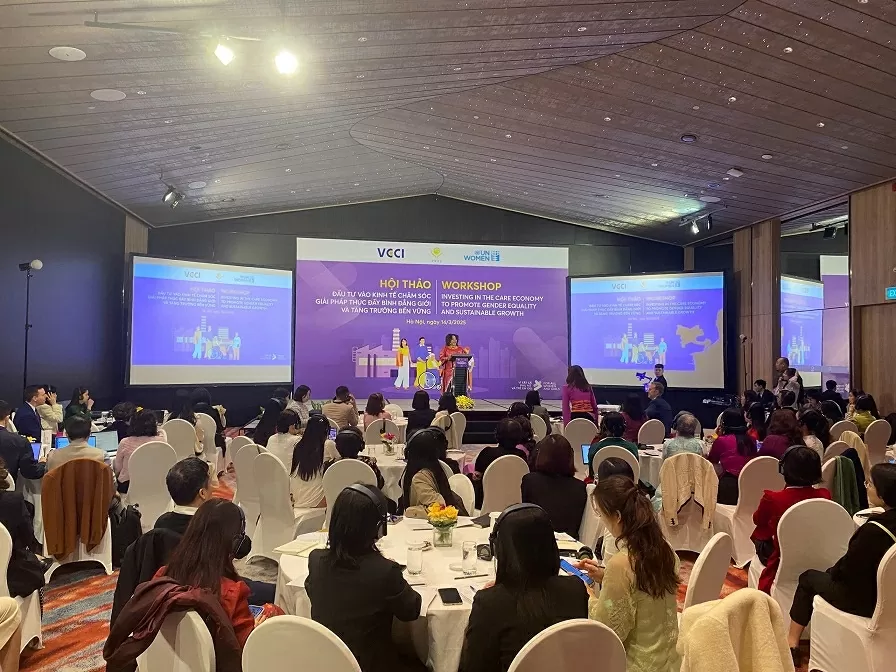
Investing in the care economy to promote gender equality and sustainable growth
Latest
 |
| Overview of the workshop on 'Investing in the care economy to promote gender equality and sustainable growth" on March 14. (Source: UN Women) |
On March 14, the Vietnam Women Entrepreneurs Council (VWEC) under the Vietnam Chamber of Commerce and Industry (VCCI) and the United Nations Entity for Gender equality and the Empowerment of women (UN Women) organized the workshop on "Investing in the care economy to promote gender equality and sustainable growth".
This event is part of a series of activities commemorating International Women's Day under the global theme "For all women and girls: Rights - Equality - Empowerment".
Caring for children, the elderly, the sick, vulnerable individuals, and family members is a shared right and responsibility. It is an essential factor in ensuring the functioning and development of families, societies, and economies.
However, across the world, women continue to shoulder a disproportionately large burden of unpaid care work compared to men. In the Asia-Pacific region, women perform unpaid care work 2.5 times more than men on average. In Vietnam, women spend nearly twice as much time on household tasks as men.
Care responsibilities are one of the main reasons limiting women's participation in the labour market. Due to a lack of care services, many women are forced to take on precarious and unstable jobs or even leave the workforce altogether.
Additionally, paid care work is predominantly performed by women, many of whom are migrant workers facing poor working conditions, low wages, and limited labour protections or social security.
When considering women’s contributions across all forms of care work, their input is valued at an estimated 11 trillion USD globally. Despite this, women and girls continue to be disadvantaged due to the undervaluation of care work and the chronic underinvestment in care services, which slows progress towards achieving gender equality.
The care economy encompasses both paid and unpaid work related to the provision of care services for individuals, including children, women, the elderly, the sick, and people with disabilities. It plays a critical role in maintaining social and economic stability.
This workshop explored key issues within the care economy, its significance, and best practices among the private sector in implementing family-friendly care policies. It also highlighted enterprises providing high-quality care services in compliance with labor and gender equality regulations and policies, ensuring accessibility for all. The discussions aimed at fostering the development of a gender-responsive care economy in Vietnam.
The event welcomed the attendance of Ms. Pauline Tamesis, UN Resident Coordinator in Vietnam, along with nearly 130 participants, including representatives from government ministries, UN agencies, international organizations, embassies, business associations, women entrepreneur networks, and enterprises in Northern Vietnam.
In her opening remarks, Ms. Mai Thị Dieu Huyen, Vice Chairwoman of the VWEC, emphasized: “Promoting gender equality in the world of work means unlocking the economic potential of women and harnessing their contributions to inclusive economic growth. Through close collaboration among all stakeholders, we can build a comprehensive care ecosystem that benefits women, businesses, and communities alike.”
In her part, Ms. Caroline T. Nyamayemombe, UN Women Representative in Vietnam, shared: “Investing in care systems is not just necessary, it is transformative towards realizing equality and the empowerment of all women and girls. Such investments benefit women, men, care recipients, communities and the country. The Government, civil society, businesses and communities must work together to build a comprehensive care economy that benefits everyone”.
This event is part of the ongoing efforts of the VWEC and UN Women to promote gender equality and enhance women's economic empowerment in Vietnam.

















